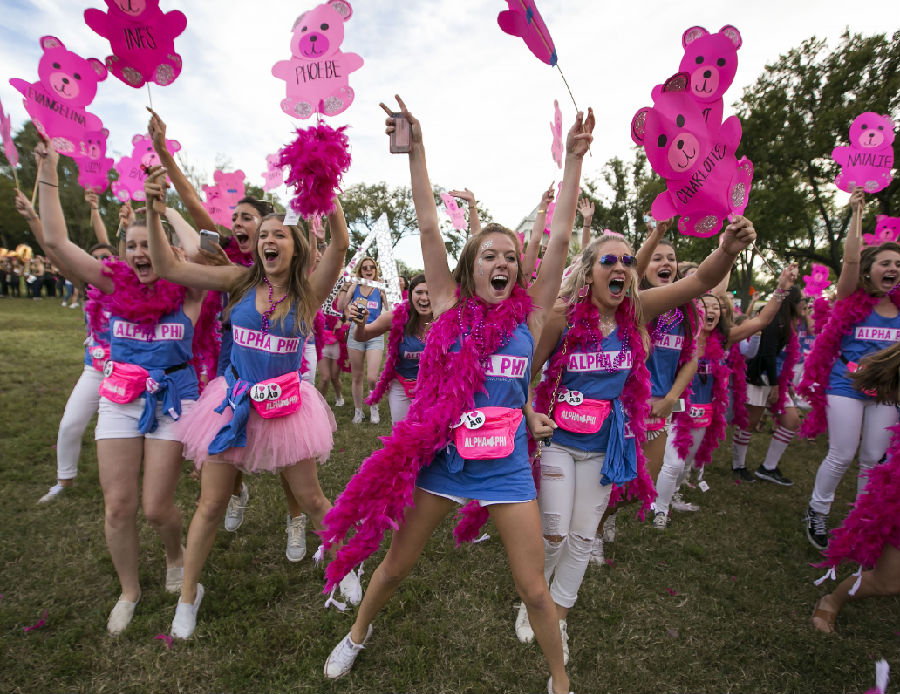"Toga Toga Toga!"
“喝!喝!喝!”
Let's be honest. Aren't fraternities overrated?
实话实说,大学兄弟会到底有没有言过其实?
"TOGA! TOGA!" "Toga! Toga! Toga!"
“喝酒!喝酒!”“喝!喝!喝!”
So, let's take a look at the fraternities that really fit the word "frats."
下面,我们就来聊聊真正称得上“兄弟会”的那些兄弟会。
We'll leave out the explicitly ethnic, religious, and academic fraternities,
在这里,我们要先撇开那些明确带有种族,宗教和学术色彩的兄弟会,
and we'll try to remember that every fraternity at every college is different.
同时牢记每所大学的每个兄弟会都是不一样的。
Still, you know the stereotype.
不过,模式化的兄弟会大家想必都已经知道了。
It's the type of place that chants "Nerds! Nerds! Nerds!"...like, a lot cooler than that.
就是会高喊“书呆子!书呆子!书呆子!”的地方......只不过,他们喊的气势比我大。
"Nerds! Nerds! Nerds! Nerds!" "Where are they?"
“书呆子!书呆子!书呆子!书呆子!” “他们在哪儿?”
"I think they're talking about us."
“他们说的好像是我们呢。”
Even when we just look at the goofy, party side of frats, there are real negatives.
即使我们只讨论兄弟会傻气,成群结党的一面,这一面也能产生切实的负面作用。
Studies have shown that frats correlate with increased binge drinking and an average .25 drop in GPA.
研究表明,兄弟会与酗酒,GPA平均下降0.25等问题存在关联。
It's only once you look into the long history of fraternities that you understand why Greek life became a part of college life.
只有当你深入了解兄弟会悠久的历史时,你才能理解兄弟会和姐妹会为什么会成为大学生活的一部分,
And why it's unlikely to go away anytime soon.
以及这些组织为什么短期内不会消失的原因。
Here's Benjamin Franklin opening a Masonic lodge.
这是开设共济会小屋的本杰明·富兰克林。
Fraternal organizations in the United States, like the Freemasons, are actually key to understanding college fraternities.
美国诸如共济会之类的兄弟组织实际上是了解大学兄弟会的关键入口。
You know that eye on his apron kinda looks like a mystical belly button?
大家注意到他围裙上看起来像一个神秘的肚脐的那只眼睛了吗?
Early fraternity histories point to Phi Beta Kappa as the first fraternity, founded at William & Mary in Virginia.
兄弟会早期的历史可以追溯到弗吉尼亚州威廉与玛丽学院成立的首个兄弟会组织“大学优秀生联谊会”。

It was an honor society, and early fraternities were similarly academic.
这是一个十分荣耀的社团,不过早期的兄弟会差不多都是学术性的。
By 1825, three purely social fraternities at Union College in Schenectady formed.
到了1825年,三个纯粹为了社交的兄弟会在位于斯克内克塔迪的联合学院成立了。
The college system had begun.
大学体系的兄弟会从此诞生了。
The next year, a man named William Morgan was murdered.
次年,一位名叫威廉·摩根的男子惨遭谋杀。
Morgan died mysteriously after threatening to expose Masonic secrets.
他是在扬言要揭露共济会的秘密后神秘死去的。
This led to an entire political party — the anti-Masonic party — revolting against the Masons in America.
这一事件甚至催生了一个专门反抗美国共济会会员的政党——反共济会党。
It's less about the mysterious murder than the climate.
不过,比起那次神秘的谋杀事件,这一政党更关心气候问题。
Secret societies were a big deal, and people were kind of afraid of them.
秘密社团势力很大,人们也有点害怕他们。
That included adult fraternities like the Masons, but also secret societies in colleges.
这类社团既包括共济会这样的成人兄弟会,也包括大学里的秘密社团。
Colleges preferred open celebrations of school, like this bucolic, only slightly violent, class day from the 1850s.
大学更喜欢公开的学校庆祝活动,比如19世纪50年代的这个田园般,只轻微有些暴力的毕业纪念日的情形。
This 1900s issue of a Sigma Nu journal shows consequences of anti-fraternity sentiment:
这本20世纪初兄弟会Sigma Nu的期刊就展示了反博爱情绪的后果:
Laws that banned fraternities or forced them to operate in secret.
禁止兄弟会或迫使其转入地下的法律的颁布。
Even successful fraternities had to find strategies to fight this.
即使是成功的兄弟会也要想办法反抗这种法律。
Delta Upsilon started as an anti-secret fraternity – a frat without secret rituals, for this reason.
兄弟会Delta Upsilon——一个没有秘密仪式的兄弟会——最初就是作为一个反秘密的兄弟会而成立的。
It seemed like frats were on the way out.
兄弟会似乎正在退出历史的舞台。
So what changed?
那么问题来了,到底是什么东西发生了改变了呢?
This chart and this flagpole are equally important to understand how frats took over schools.
要了解兄弟会是如何接管了学校这一点,这张表和这个旗杆同样重要。
Look at that jump from 63,000 students in 1870 to 600,000 in 1920.
我们来看,大学生的规模从1870年的6.3万名暴涨到了1920年的60万名。
It's massive.
这一规模是相当巨大的。
This jump in enrollment created a lot of problems, and fraternities helped colleges solve them.
入学率的激增引发了很多的问题,而兄弟会帮助大学解决了这些问题。












